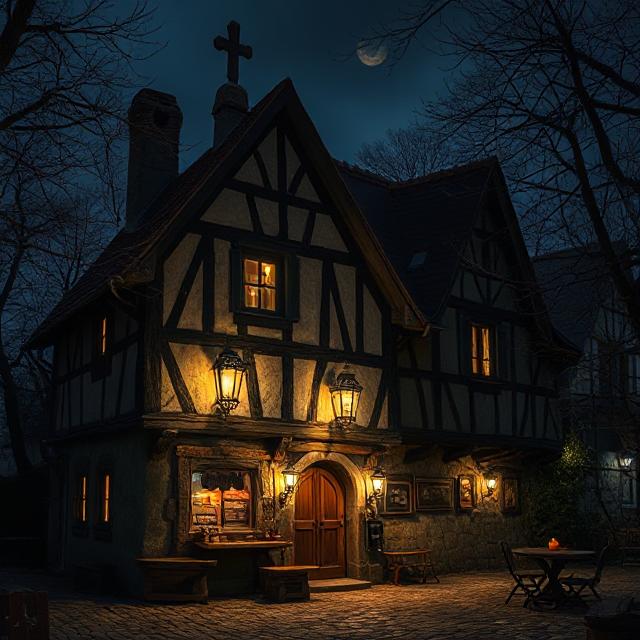Hearing this, the boy’s eyes widen—vast and gleaming, like the wide web of humanity that binds all people together. At that moment, you sense you’ve gained more than just a guide; you’ve found a willing follower, eager to please—at least until the promise of gold is fulfilled.
– I can take you to Zalenica – he says, confirming what his countenance had already conveyed.
It’s a win-win. Whether he helps you get back to Moravice and claim back what rightfully belongs to you—wealth you’re determined to reclaim from the greedy clutches of your fake friends — or whether he just helps you fulfill your moral duty as second in line to the Duchy of Moravia: seek out your uncle, Prince Stanislav, and bring news of his realm back to your father. In the latter case, you won’t have to give away any lands nor title.
You enter the city of Dahranjia and find yourself in a stunning piazza, bursting with color. Blossoming trees line the square, their vivid hues a testament to the city’s access to water. Clearly, this place thrives—either by tapping into an underground aquifer or by lying just on the edge of the green lands, beyond the cruel grasp of the desert.
You follow your young guide with the implicit trust one gives to those who know who their master is. He leads your dromedaries to a watering trough, and you dismount. Your legs, swollen and sore from days of unbroken travel, welcome the relief. For the first time in what feels like ages, you feel a wind at your back—like a ship caught in a favorable current, gliding toward opportunity.
You’re hopeful—no, certain—that your uncle will give you the good news you long for, which will provide for a swift resolution, a journey home, and the comfort of knowing all is well. It must all be a big misunderstanding. Surely, Emperor Claudius hasn’t declared war on Zalenia. Your uncle is too wise for that, too skilled in diplomacy to provoke a tyrant when there are fortunes to be made in peace.
You know your bloodline—and the family motto that has guided your kin for generations: Business is business. You’re convinced that money will heal whatever political wound festers. After all, that which trade has joined, swords cannot sunder.
You feel confident—justifiably so. Your instincts have carried you through betrayal, across barren lands, and into the heart of survival itself. You haven’t merely endured the desert; you’ve conquered it. And now, with gold in your satchel and destiny within reach, you feel the urge to celebrate.
Your eyes scan the lively streets of Dahranjia, ignoring the cautious glance of your young companion. You trust your own gut—after all, it hasn’t failed you yet. That’s when your gaze lands on a tavern tucked into the corner of the piazza, its doorway shaded by a woven canopy, laughter and the clinking of cups spilling out into the sunlit air.
“Come on,” you bark, already striding toward it, a subtle swagger in your step. You don’t wait for the boy to catch up. The moment is yours for the taking.

Inside, the tavern hums with life. Men of all sorts and origins crowd the smoky air. Some wear the worn garb of locals—merchants, shepherds, and craftsmen—while others stand out like shadows under the sun, foreign and unsettling, as rare as honesty in a woman’s tongue.
You barely spare a glance for the common folk. Instead, your eyes lock onto the more intriguing figures: weathered warriors nursing their drinks with quiet intensity, and the mysterious ones—silent, watchful, and sharp-eyed. Assassins, you think, the kind who thrive on whispers and easy coin, always ready for the next job. Your hand twitches near your belt, more out of habit than suspicion. In this place, trust is a currency rarer than gold, and you have none to spare.
While you sip the fresh wheat ale the bartender sets before you, a sharply dressed woman approaches. Rare as a pearl among these empty shells, she had gone unnoticed until now—her elegant attire belying the delicate aristocratic physiognomy, which only became clear once she came within eye’s reach.

— Far from our land, aren’t we? — she says, her voice barely above a whisper.
— Indeed, — you reply with a cheerful ease.
There’s nothing in her that stirs suspicion. She carries herself with the effortless grace only true aristocrats possess—the inherited talent of putting others at ease with nothing but their presence.
— How fares your journey, Vania? —she asks, and it feels as if a horse had thrown you off its back and slammed you into the hard ground.
— How do you know my name? — you gasp.
— How could I not?— she says, smiling softly. —Coming from Zalenia, I must know the second in line to the Duchy.
— And who are you, if I may ask?
— I am Baroness Vesna Morawiecka of Dravice.
— Pleased to meet you, Baroness. What brings you to these parts?— you reply, relieved to be recognized by a friend rather than a foe.
— I believe I’m here for the same reason as you: to help preserve the integrity of the Slavic bloc.
— I’m sorry to disappoint you, Baroness, but I’ve come only to visit my uncle and carry news of his realm back to my father. I hold no sway in that decision, nor I intend to. I have business to attend to back home.
— I understand, Your Grace. But a word of advice: Don’t reveal your identity to anyone, because you’re in great danger here. Things have taken an… unexpected turn — whether for better or worse, for you, I cannot yet say. I’d rather not speak too much here, especially since you have no reason to trust me… yet. But allow me to tell you: You can’t remain indifferent to this war, Your Grace. Your wealth depends on it.
— So what are you asking me to do? — you ask cautiously.
— Oh, Your Grace, it is not for me to command, but for you, — she says. — Even here, far from our homeland, my loyalty to you remains unchanged.
You hesitate no more. You know what you must do.

One Comment